中考英语易混词组经典辨析
中考英语常用易混淆单词词组的区别用法详解
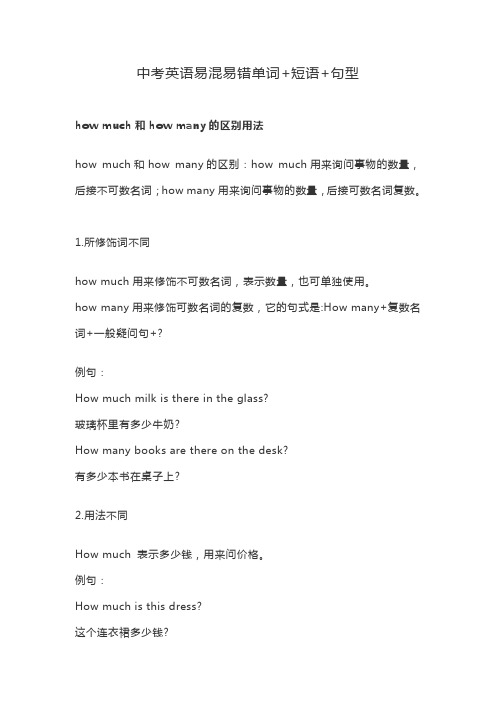
中考英语易混易错单词+短语+句型how much和how many的区别用法how much和how many的区别:how much用来询问事物的数量,后接不可数名词;how many用来询问事物的数量,后接可数名词复数。
1.所修饰词不同how much用来修饰不可数名词,表示数量,也可单独使用。
how many用来修饰可数名词的复数,它的句式是:How many+复数名词+一般疑问句+?例句:How much milk is there in the glass?玻璃杯里有多少牛奶?How many books are there on the desk?有多少本书在桌子上?2.用法不同How much 表示多少钱,用来问价格。
例句:How much is this dress?这个连衣裙多少钱?How many 表示多少,用来问数量。
例句:How many apples do you have?你有多少苹果?in和on的区别用法当我们表示某些东西被其他东西所包围时使用“in”这个词。
而“on”用于描述物体被放置在其他物体上方或外部的情况。
in可表时间,表地点,表手段、方法、材料。
on表示时间、地点、方位等。
1.意思不同in:prep.在... 里;在... 地方;在... 期间on:prep.在... 之上2.用法不同in:in着重一段时间的过程,常用于重复动作或延续动作。
in表示从现在时间算起推移到将来的一段时间之后,一般与将来时态连用。
例句:He is a layman in economics.他对经济学一窍不通。
on:表示“在物体的表面上”,只能用on的表达方式有on the next morning,on the following。
例句:The spider is walking on the ceiling.蜘蛛在天花板上爬行。
3.侧重点不同in:表示“在其中”。
on:表示“在表面”。
中考英语78个易混易错单词+短语+句型(全)
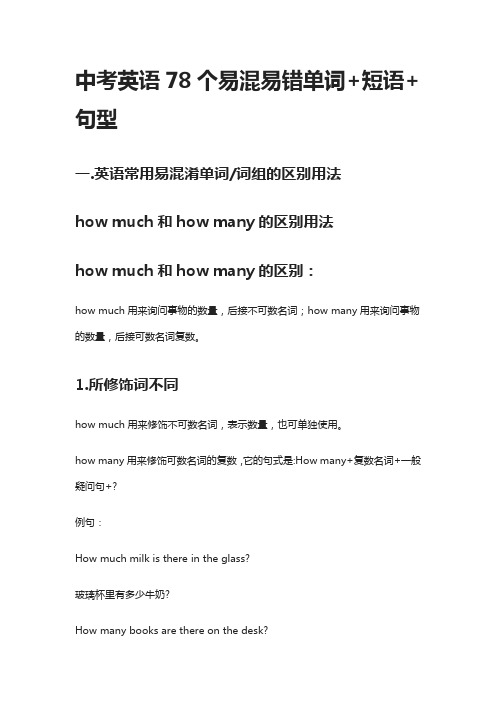
中考英语78个易混易错单词+短语+句型一.英语常用易混淆单词/词组的区别用法how much和how many的区别用法how much和how many的区别:how much用来询问事物的数量,后接不可数名词;how many用来询问事物的数量,后接可数名词复数。
1.所修饰词不同how much用来修饰不可数名词,表示数量,也可单独使用。
how many用来修饰可数名词的复数,它的句式是:How many+复数名词+一般疑问句+?例句:How much milk is there in the glass?玻璃杯里有多少牛奶?How many books are there on the desk?有多少本书在桌子上?2.用法不同How much 表示多少钱,用来问价格。
例句:How much is this dress?这个连衣裙多少钱?How many 表示多少,用来问数量。
例句:How many apples do you have?你有多少苹果?in和on的区别用法:当我们表示某些东西被其他东西所包围时使用“in”这个词。
而“on”用于描述物体被放置在其他物体上方或外部的情况。
in可表时间,表地点,表手段、方法、材料。
on表示时间、地点、方位等。
1.意思不同in:prep.在 ... 里;在 ... 地方;在 ... 期间on:prep.在 ... 之上2.用法不同in:in着重一段时间的过程,常用于重复动作或延续动作。
in表示从现在时间算起推移到将来的一段时间之后,一般与将来时态连用。
He is a layman in economics.他对经济学一窍不通。
on:表示“在物体的表面上”,只能用on的表达方式有on the next morning,on the following。
The spider is walking on the ceiling.蜘蛛在天花板上爬行。
3.侧重点不同in:表示“在其中”。
中考易混清词汇unusual

中考易混清词汇unusual中考英语考试中,经常会涉及一些词汇的辨析,有些单词很相似,容易混淆。
本文将重点介绍一组常见的易混清词汇——"unusual","ordinary"以及"unique"。
希望通过本文的解析,能够帮助大家更好地理解和运用这些词汇。
一、unusual"unusual"是一个形容词,意思是“不寻常的”或者“罕见的”。
它用来描述与平常不同的、不寻常的事物或情况。
当我们遇到一些不同于日常经历的事情时,我们可以使用"unusual"这个词。
比如,一个在街上戴着奇特帽子的人,我们可以说他穿着不寻常。
再比如,突如其来的雨雪是一个不寻常的天气现象。
二、ordinary"ordinary"也是一个形容词,意思是“普通的”或者“常见的”。
它用来描述那些我们日常生活中接触最多的事物和情况。
与"unusual"相比,"ordinary"强调的是符合常规、常见的特点。
比如,我们每天都会见到普通的公交车,普通的食物,这些都属于ordinary事物。
三、unique"unique"同样是一个形容词,意思是“独特的”或者“独一无二的”。
它用来形容那些独一无二的事物,与其他事物不同。
与"unusual"相比,"unique"更加强调某个事物的独特性,指的是只有一个或者很少几个。
比如,著名画家达·芬奇的画作就是unique的,因为没有人能够完全复制他的作品。
在使用这些词汇的时候,我们需要注意它们的搭配和用法。
比如,我们可以说一个人的外表很unusual,但不可以说他很unique,因为unique的意思是"独一无二的",用来形容事物而不是人。
另外,我们可以说一个事物是ordinary和unusual的,但不可以说它是ordinary和unique的,因为这两个词意思相对矛盾。
初中英语中考常考易混词组辨析(共16组)
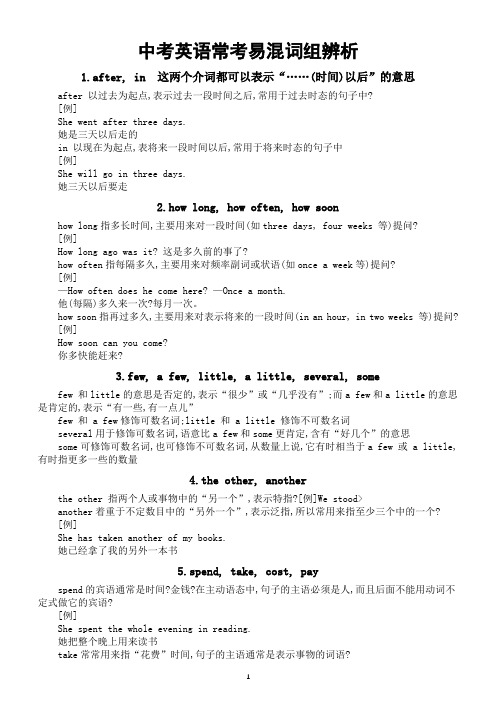
中考英语常考易混词组辨析1.after, in 这两个介词都可以表示“……(时间)以后”的意思after 以过去为起点,表示过去一段时间之后,常用于过去时态的句子中?[例]She went after three days.她是三天以后走的in 以现在为起点,表将来一段时间以后,常用于将来时态的句子中[例]She will go in three days.她三天以后要走2.how long, how often, how soonhow long指多长时间,主要用来对一段时间(如three days, four weeks 等)提问?[例]How long ago was it? 这是多久前的事了?how often指每隔多久,主要用来对频率副词或状语(如once a week等)提问?[例]—How often does he come here? —Once a month.他(每隔)多久来一次?每月一次。
how soon指再过多久,主要用来对表示将来的一段时间(in an hour, in two weeks 等)提问?[例]How soon can you come?你多快能赶来?3.few, a few, little, a little, several, somefew 和little的意思是否定的,表示“很少”或“几乎没有”;而a few和a little的意思是肯定的,表示“有一些,有一点儿”few 和 a few修饰可数名词;little 和 a little 修饰不可数名词several用于修饰可数名词,语意比a few和some更肯定,含有“好几个”的意思some可修饰可数名词,也可修饰不可数名词,从数量上说,它有时相当于a few 或 a little,有时指更多一些的数量4.the other, anotherthe other 指两个人或事物中的“另一个”,表示特指?[例]We stood>another着重于不定数目中的“另外一个”,表示泛指,所以常用来指至少三个中的一个?[例]She has taken another of my books.她已经拿了我的另外一本书5.spend, take, cost, payspend的宾语通常是时间?金钱?在主动语态中,句子的主语必须是人,而且后面不能用动词不定式做它的宾语?[例]She spent the whole evening in reading.她把整个晚上用来读书take常常用来指“花费”时间,句子的主语通常是表示事物的词语?How long will this job take you?你做这项工作要花多长时间?cost 指花费时间?金钱或力气等,只能用表示事物的词做主语,并且不能用于被动语态?[例]How much does the jacket cost?这件夹克多少钱?pay 主要指主语(某人)买某物(或为某事)付多少钱(给某人)?[例]I pay for my rooms by month.我按月支付租金6.among, betweenbetween 的意思是“在……中间,在……之间”,一般指在两者之间?[例]There is a table between two windows.在两扇窗户之间有一张桌子。
英语中考牢记20组易混易错词语辨析
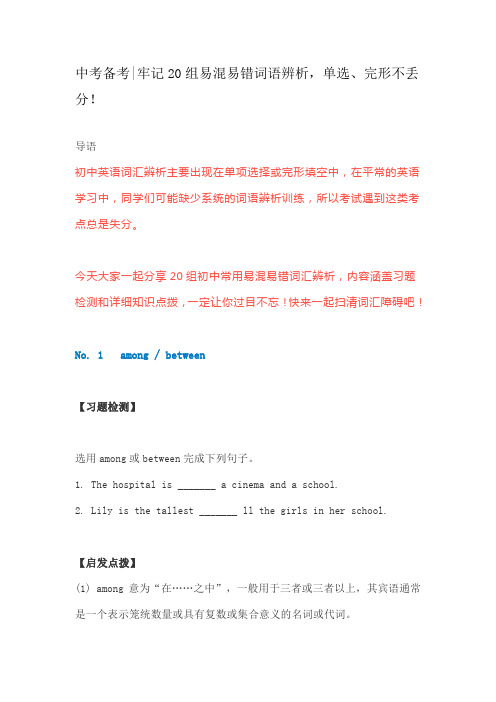
中考备考|牢记20组易混易错词语辨析,单选、完形不丢分!导语初中英语词汇辨析主要出现在单项选择或完形填空中,在平常的英语学习中,同学们可能缺少系统的词语辨析训练,所以考试遇到这类考点总是失分。
今天大家一起分享20组初中常用易混易错词汇辨析,内容涵盖习题检测和详细知识点拨,一定让你过目不忘!快来一起扫清词汇障碍吧!No. 1 among / between【习题检测】选用among或between完成下列句子。
1. The hospital is _______ a cinema and a school.2. Lily is the tallest _______ ll the girls in her school.【启发点拨】(1) among意为“在……之中”,一般用于三者或三者以上,其宾语通常是一个表示笼统数量或具有复数或集合意义的名词或代词。
(2) between一般指两者之间,其宾语通常是表示两者概念的名词或代词,或由and连接的两个具体的人或物。
between有时也可表示多者之中的“两两之间”。
如:Switzerland lies between France, Germany, Austria and Italy.Key:1. between2. amongNo. 2 lay / lie【习题检测】用lay或lie的适当形式完成句子。
1. I _______ the table when my mother cooked the meal.2. John was ill and _______ in bed all morning.【启发点拨】(1) lay作动词,可意为“摆放(餐桌)”,其过去式与过去分词均为laid,现在分词为laying,常用于短语lay the table,意为“摆放餐桌”。
如:Tom was laying the table.(2) lie作动词,意为“躺;平躺”时,过去式为lay,过去分词为lain,现在分词为lying。
中考英语易混淆英语词汇辨析名词代词连词

中考英语易混淆英语词汇辨析:名词-代词-连词一、容易混淆的名词[考试说明] 了解名词在句中所充当的成分,理解并能区别所学的可数名词和不可数名词;熟练掌握所学可数名词复数形式的构成,在口语和书面语的表达中正确运用;掌握物质名词及其数量的表达方法;了解专有名词的概念及一般用法;熟练掌握所学名词所有格的用法;了解集合名词和抽象名词的概念及一般用法。
1. job & work[误] I’m busy today, for I have a lot of jobs to do.[正] I’m busy to day, for I have a lot of work to do.job意思是a piece of work,指已做或要做、应做的具体的某种工作,实际含义是“职业”,而work通常指抽象意义上的工作,是不可数名词,也可指“工作场所”。
2. by train & change trains[误] We came here by the train.[正] We came here by train.[正] We came here on/in the train.[误] We have to change the train at the next station.[正] We have to change trains at the next station.train意思是“火车”,表示“乘火车”,用by train或on/ the train,表示“换火车”,train必须用复数形式,且前面不加限定词。
二、容易混淆的代词:[考试说明] 熟练掌握人称代词主格、宾格形式及基本用法,在口语和书面语的表达中正确运用;掌握形容词性物主代词和名词性物主代词的基本用法;掌握反身代词作为宾语和同位语的基本用法;熟练掌握指示代词和疑问代词的基本用法.1. either & each & none & neither & both & all & some[误] Either of the books are good.[正] Either of the books is good.either/ each / none / neither of+复数名词或代词作主语时,谓语动词用单数, 其中neither的也可用复数;both/ all /some of+复数名词或代词作主语时,谓语动词用复数三、容易混淆的连词:[考试说明] 掌握并列连词(如:and、but、or)和从属连词(如:when、if、that等)的基本用法。
中考英语易混词汇辨析:fine, nice, good, well

词汇辨析:fine, nice, good, well本站原创| 2015-08-26分享到:四者都可用作形容词表示"好"之意,但前三者既可作表语又可作定语,而后者仅用作表语。
主要区别在于:(1) fine指物时表示的是质量上的"精细",形容人时表示的是"身体健康",也可以用来指"天气晴朗"。
例如:Your parents are very fine. 你父母身体很健康。
That's a fine machine.那是一台很好的机器It's a fine day for a walk today.今天是散步的好时候。
(2)nice主要侧重于人或物的外表,有"美好","漂亮"的意思,也可用于问候或赞扬别人。
例如:Lucy looks nice. 露西看上去很漂亮。
These coats are very nice. 那些裙子很好看。
Nice to meet you. 见到你很高兴。
It's very nice of you. 你真好。
(3)good形容人时指"品德好",形容物时指"质量好",是表示人或物各方面都好的普通用语。
例如:Her son is a good student. 她儿子是一个好学生。
The red car is very good. 那辆红色小汽车很好。
(4)well只可用来形容人的"身体好",但不能作定语,它也能用作副词作状语,多放在所修饰的动词之后。
例如:I'm very well, thanks. 我身体很好,谢谢。
My friends sing well. 我的朋友们歌唱得好。
中考英语易混词组经典辨析
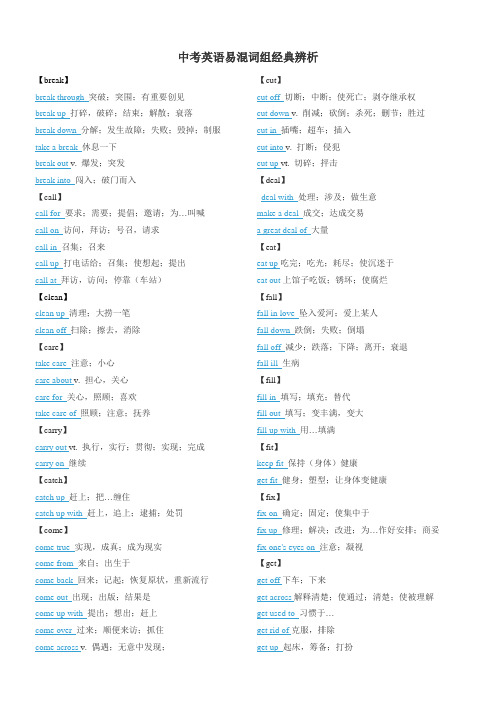
中考英语易混词组经典辨析【break】break through 突破;突围;有重要创见break up 打碎,破碎;结束;解散;衰落break down 分解;发生故障;失败;毁掉;制服take a break 休息一下break out v. 爆发;突发break into 闯入;破门而入【call】call for 要求;需要;提倡;邀请;为…叫喊call on 访问,拜访;号召,请求call in 召集;召来call up 打电话给;召集;使想起;提出call at 拜访,访问;停靠(车站)【clean】clean up 清理;大捞一笔clean off 扫除;擦去,消除【care】take care 注意;小心care about v. 担心,关心care for 关心,照顾;喜欢take care of 照顾;注意;抚养【carry】carry out vt. 执行,实行;贯彻;实现;完成carry on 继续【catch】catch up 赶上;把…缠住catch up with 赶上,追上;逮捕;处罚【come】come true 实现,成真;成为现实come from 来自;出生于come back 回来;记起;恢复原状,重新流行come out 出现;出版;结果是come up with 提出;想出;赶上come over 过来;顺便来访;抓住come across v. 偶遇;无意中发现;【cut】cut off 切断;中断;使死亡;剥夺继承权cut down v. 削减;砍倒;杀死;删节;胜过cut in 插嘴;超车;插入cut into v. 打断;侵犯cut up vt. 切碎;抨击【deal】deal with 处理;涉及;做生意make a deal 成交;达成交易a great deal of 大量【eat】eat up吃完;吃光;耗尽;使沉迷于eat out上馆子吃饭;锈坏;使腐烂【fall】fall in love 坠入爱河;爱上某人fall down 跌倒;失败;倒塌fall off 减少;跌落;下降;离开;衰退fall ill 生病【fill】fill in 填写;填充;替代fill out 填写;变丰满,变大fill up with 用…填满【fit】keep fit 保持(身体)健康get fit 健身;塑型;让身体变健康【fix】fix on 确定;固定;使集中于fix up 修理;解决;改进;为…作好安排;商妥fix one's eyes on 注意;凝视【get】get off下车;下来get across解释清楚;使通过;清楚;使被理解get used to 习惯于…get rid of克服,排除get up 起床,筹备;打扮get on 上车,上马;进展,使前进get out of 逃避;避免get through 通过;到达;做完;接通电话get away 离开;逃脱;出发【give】give up放弃;停止;投降;使埋头于give away 放弃;泄露;分发;出卖give out 分发,发出;公布,发表;用尽,精疲力竭give in v. 屈服;让步;交上give off 发出(光等);长出(枝、杈等)【go】go ahead开始;前进;先走;干吧go up上升;上涨;增长;建起go on 继续;过去;继续下去;发生go on with继续;进行;暂时使用go on well with与某人相处融洽=get on withgo out of从…出来,离开go away走开go through参加;经受;仔细检查;被通过go over复习,重温;仔细检查;转变;润色go by经过;顺便走访;凭…判断【hand】hand out分发;施舍;把…拿出来hand over 交出;移交hand up举手;呈交上级hand in 交上;提交;呈送on the one hand…on the other hand 一方面……另一方面……shake hands 握手【hang】hang out 挂出;闲逛hang up 挂断电话;搁置,拖延【help】help out 帮助…摆脱困难help with 帮忙某人做…help oneself 自用;自取所需with the help of 在…的帮助下help each other 互相帮助couldn't help doing 禁不住;不得不ask for help 寻求帮助;求助;请求帮助with one's help 在某人的帮助下【keep】keep on 继续;穿着…不脱keep up with 赶得上;和…保持联系keep in mind 记住keep in touch 保持联络keep in touch with 与…保持联系keep away from 远离,回避keep healthy 保持健康keep an eye on v. 照看;留意;密切注视keep moving 继续前进【laugh】laugh at 嘲笑;have a good laugh 笑得好开心【learn】learn from意思是听到获悉,向…学习,了解,learn about是学习某方面的知识learn by oneself 自学learn of 听说,听到;获悉learn to do 做事;学会做某事;学习做…learn by heart 记住;默记;背诵learn and live 活到老学到老;学无止境【leave】leave for 动身去leave out 遗漏,省去;不考虑on leave 休假;在休假中【let】let out放掉;发出;放走;放出let alone更不用说;更别提;不干涉;不打扰let down使失望;降低;放低;放衣服let in放进;让...进入;进入;……【Look】look about /around环顾四周look after照顾,照看,照料,关心=take care oflook at 看……,注视……look back回顾,回想=think backlook down on /upon 看不起,瞧不起look for寻找look forward to v-ing 期待,盼望look into调查,研究,了解。
初中英语常见常考易混短语例解
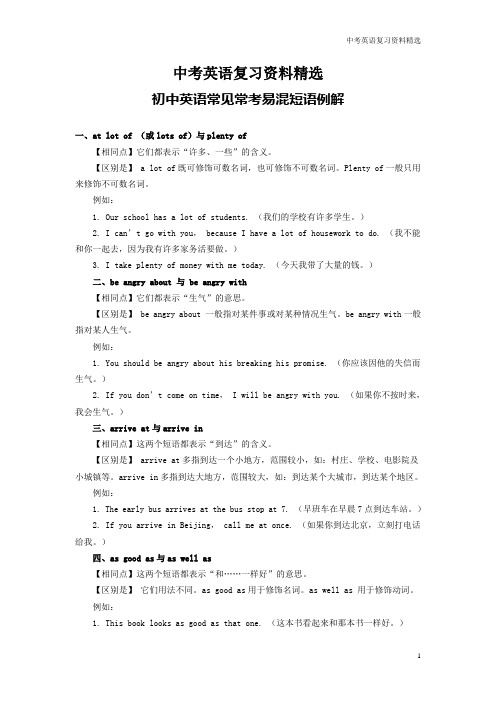
中考英语复习资料精选初中英语常见常考易混短语例解一、at lot of (或lots of)与plenty of【相同点】它们都表示“许多、一些”的含义。
【区别是】 a lot of既可修饰可数名词,也可修饰不可数名词。
Plenty of一般只用来修饰不可数名词。
例如:1. Our school has a lot of students. (我们的学校有许多学生。
)2. I can’t go with you, because I have a lot of housework to do. (我不能和你一起去,因为我有许多家务活要做。
)3. I take plenty of money with me today. (今天我带了大量的钱。
)二、be angry about 与 be angry with【相同点】它们都表示“生气”的意思。
【区别是】 be angry about 一般指对某件事或对某种情况生气。
be angry with一般指对某人生气。
例如:1. You should be angry about his breaking his promise. (你应该因他的失信而生气。
)2. If you don’t come on time, I will be angry with you. (如果你不按时来,我会生气。
)三、arrive at与arrive in【相同点】这两个短语都表示“到达”的含义。
【区别是】 arrive at多指到达一个小地方,范围较小,如:村庄、学校、电影院及小城镇等。
arrive in多指到达大地方,范围较大,如:到达某个大城市,到达某个地区。
例如:1. The early bus arrives at the bus stop at 7. (早班车在早晨7点到达车站。
)2. If you arrive in Beijing, call me at once. (如果你到达北京,立刻打电话给我。
【中考英语、英语语法】【人教版】中考英语动词及动词短语考点剖析
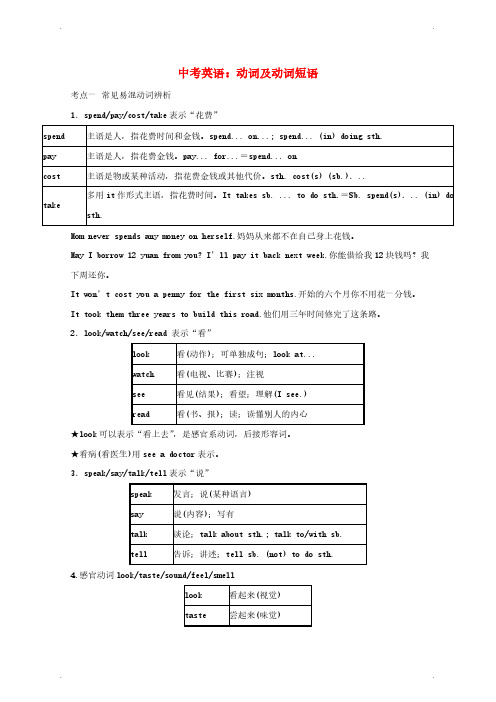
中考英语:动词及动词短语考点一常见易混动词辨析1.spend/pay/cost/take表示“花费”spend主语是人,指花费时间和金钱。
spend... on...; spend... (in) doing sth.pay主语是人,指花费金钱。
pay... for...=spend... oncost主语是物或某种活动,指花费金钱或其他代价。
sth. cost(s) (sb.)...多用it作形式主语,指花费时间。
It takes sb. ... to do sth.=Sb. spend(s)... (in) doin takesth.Mom never spends any money on herself.妈妈从来都不在自己身上花钱。
May I borrow 12 yuan from you? I’ll pay it back next week.你能借给我12块钱吗?我下周还你。
It won’t cost you a penny for the first six months.开始的六个月你不用花一分钱。
It took them three years to build this road.他们用三年时间修完了这条路。
2.look/watch/see/read 表示“看”look看(动作);可单独成句;look at...watch看(电视、比赛);注视see看见(结果);看望;理解(I see.)read看(书、报);读;读懂别人的内心★look可以表示“看上去”,是感官系动词,后接形容词。
★看病(看医生)用see a doctor表示。
3.speak/say/talk/tell表示“说”speak发言;说(某种语言)say说(内容);写有talk谈论;talk about sth.; talk to/with sb.tell告诉;讲述;tell sb. (not) to do sth.4.感官动词look/taste/sound/feel/smelllook看起来(视觉)taste尝起来(味觉)sound听起来(听觉)feel摸起来(触觉)smell闻起来(嗅觉)5.borrow/lend/keep表示“借”borrow借用;borrow sth. from sb.lend借给;lend sth. to sb.keep借用若干时间;keep... for 2 days6.hope/wish/expecthope希望;hope to to sth.; hope+that 从句wish但愿、希望;wish to do sth.; wish sb. to do sth.; wish+that 从句expect期待、期望; expect to do sth.; expect sb. to do sth.7.forget/leaveforget表示“忘记”时,forget通常不能与表示地点的副词或短语连用leave在表示“遗忘”时,通常要与表示地点的状语连用8.hear/listen/soundhear听见;hear+名词(强调听的结果)listen听;listen to+名词(强调听的过程)sound听起来; sound+形容词(强调听的效果)9.wear/put on/dress/be inwear“穿着;戴着”,强调状态,wear后可接穿戴的东西,包括眼镜、首饰等put on“穿上;戴上”,指“穿”的动作,反义词为“take off”“穿衣”,是及物动词,后接人作宾语,意为“给某人穿衣服”;dress onself“打扮;给自己穿dress衣服”be in表示状态,后接衣服,也可接表颜色的词10.reach/get/arrivereach“到达”,是及物动词(比get更正式),其后可直接接地点名词作宾语(不能用介词)get“到达”,不及物动词,之后通常接介词 toarrive“到达”,不及物动词,之后通常接介词 at (一般用于较小的地方)或 in (一般用于较大的地方)1.(2018·山东菏泽单县常青学校模拟三)—I meeting Jack today because I am still angry with him.—Come on, Mary. You are good friends.A.avoid B.expect C.enjoy2.(2018·广东普宁模拟改编)I don’t know the restaurant, but it’s to be quite a good one.A.said B.told C.spoken3.(2018·广西贵港港南二模改编)—How much money did he you yesterday?—500 yuan. I told him I would return it to him in three weeks.A.give B.borrow C.lend4.(2018·甘肃定西中考改编)—I can’t find my English textbook.—Is it possible that you it at home?A.lost B.forgot C.left5.(2018·四川泸州中考改编)It about eight minutes for the light to travel from the sun to the earth.A.costs B.spends C.takes考点二动词短语辨析常考的动词短语辨析有三种:第一种是同一动词的不同搭配;第二种是同一副词或介词与不同动词的搭配;第三种是完全不同的动词短语。
中考英语易混词汇辨析
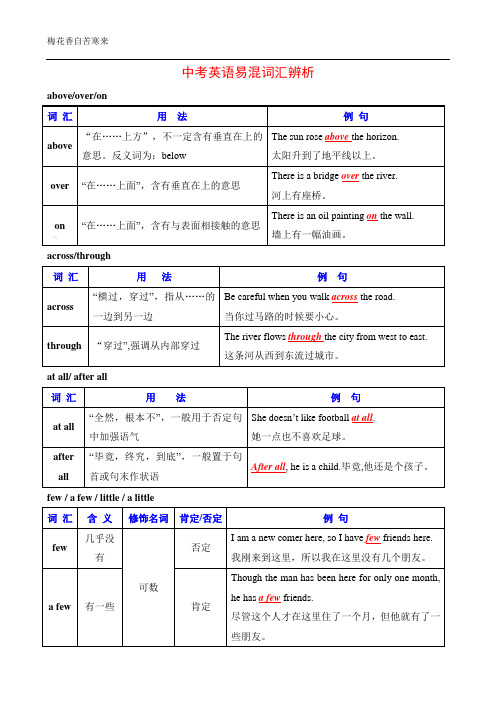
中考英语易混词汇辨析above/over/on词汇用法例句above “在……上方”,不一定含有垂直在上的意思。
反义词为:belowThe sun rose above the horizon.太阳升到了地平线以上。
over “在……上面”,含有垂直在上的意思There is a bridge over the river. 河上有座桥。
on“在……上面”,含有与表面相接触的意思There is an oil painting on the wall. 墙上有一幅油画。
across/through词汇用法例句across “横过,穿过”,指从……的一边到另一边Be careful when you walk across the road.当你过马路的时候要小心。
through“穿过”,强调从内部穿过The river flows through the city from west to east. 这条河从西到东流过城市。
at all/ after all词汇用法例句at all “全然,根本不”,一般用于否定句中加强语气She doesn’t like football at all.她一点也不喜欢足球。
after all “毕竟,终究,到底”,一般置于句首或句末作状语After all, he is a child.毕竟,他还是个孩子。
few / a few / little / a little词汇含义修饰名词肯定/否定例句few 几乎没有可数否定I am a new comer here, so I have few friends here.我刚来到这里,所以我在这里没有几个朋友。
a few 有一些肯定Though the man has been here for only one month, he has a few friends.尽管这个人才在这里住了一个月,但他就有了一些朋友。
中考英语之易混淆词汇知识点辨析
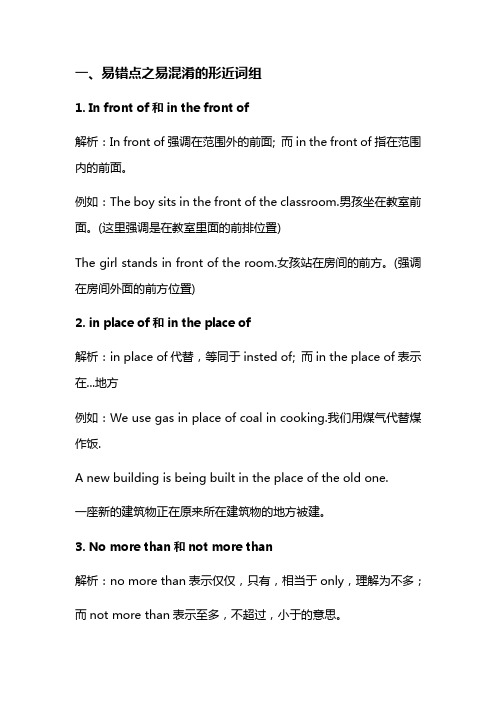
一、易错点之易混淆的形近词组1.In front of和in the front of解析:In front of强调在范围外的前面; 而in the front of指在范围内的前面。
例如:The boy sits in the front of the classroom.男孩坐在教室前面。
(这里强调是在教室里面的前排位置)The girl stands in front of the room.女孩站在房间的前方。
(强调在房间外面的前方位置)2.in place of和in the place of解析:in place of代替,等同于insted of; 而in the place of表示在...地方例如:We use gas in place of coal in cooking.我们用煤气代替煤作饭.A new building is being built in the place of the old one.一座新的建筑物正在原来所在建筑物的地方被建。
3.No more than和not more than解析:no more than表示仅仅,只有,相当于only,理解为不多;而not more than表示至多,不超过,小于的意思。
例如:He is no more than an ordinary English teacher. 他只不过是个普通的英文老师。
He has not more than three children. 他最多3 个孩子(有或许还不到三个)4.On earth和on the earth解析:两者都有在地上,在地球上的意思,但on earth还有到底,究竟的意思;On the earth只是单纯的表示在地上,在地球上例如:where on earth did you spring from?你究竟从哪里冒出来的?What if there was no lead on the earth at all?如果地球上根本就没有铅这种物质怎么办?5.At all和after all解析:at all表示根本,全然的意思,常用短语not at all表示一点也不;after all表示到底,毕竟的意思例如:I don't know him at all. 我根本不认识他。
中考英语常用易混淆单词词组的区别用法详解
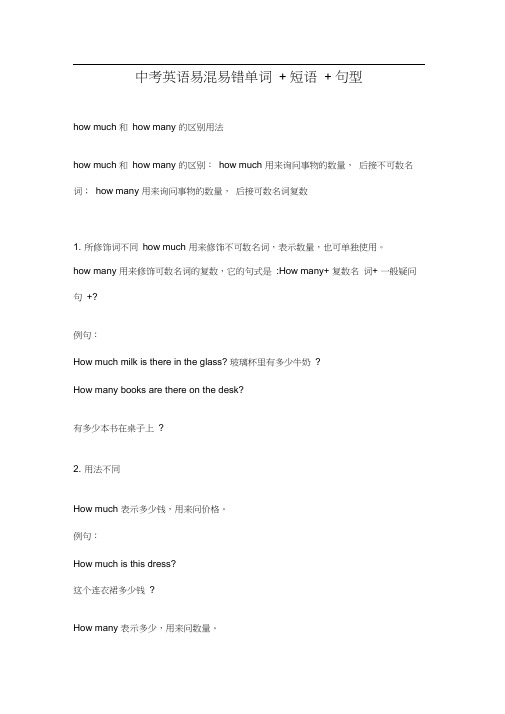
中考英语易混易错单词+ 短语+ 句型how much 和how many 的区别用法how much 和how many 的区别:how much 用来询问事物的数量,后接不可数名词;how many 用来询问事物的数量,后接可数名词复数1. 所修饰词不同how much 用来修饰不可数名词,表示数量,也可单独使用。
how many 用来修饰可数名词的复数,它的句式是:How many+ 复数名词+ 一般疑问句+?例句:How much milk is there in the glass? 玻璃杯里有多少牛奶?How many books are there on the desk?有多少本书在桌子上?2. 用法不同How much 表示多少钱,用来问价格。
例句:How much is this dress?这个连衣裙多少钱?How many 表示多少,用来问数量。
例句:How many apples do you have?你有多少苹果?in 和on 的区别用法当我们表示某些东西被其他东西所包围时使用“ in ”这个词。
而“ on 用于描述物体被放置在其他物体上方或外部的情况。
in 可表时间,表地点,表手段、方法、材料。
on 表示时间、地点、方位等。
1. 意思不同in :prep. 在... 里;在... 地方;在... 期间on :prep. 在... 之上2. 用法不同in :in 着重一段时间的过程,常用于重复动作或延续动作。
in 表示从现在时间算起推移到将来的一段时间之后,一般与将来时态连用。
例句:He is a layman in economics.他对经济学一窍不通on :表示“在物体的表面上”,只能用on 的表达方式有on the next morning ,on the following 。
例句:The spider is walking on the ceiling.蜘蛛在天花板上爬行。
2020年中考英语易混词组经典辨析

2020年中考英语易混词组经典辨析★★★★关于turn1. turn on 打开;发动Will you turn on the radio? 你打开收音机好吗?2. turn off 关掉Turn off the light before you leave. 离开前请把灯关掉。
3. turn up 出现,露面eg: He didn't turn up at the meeting yesterday. 出现;发生Something unexpected has turned up. 发生了没有意料到的事情。
4. turn down1,拒绝His proposal was turned down. 他的提议被拒绝了。
2,关小Dad,can you turn down the TV? It's too noisy. -----OK.爸,你能把电视声音关小一点吗------好的5. turn out结果是;证明是The party turned out to be very successful.晚会结果开得很成功。
6.turn back阻止;阻挡The car was turned back at the frontier.汽车在边境处被拦住了。
7.turn in交上;归还Turn in all the tools after use.全部工具用后都要归还。
8.turn to求助于;转向We can turn to him for help.我们可以求助于他。
9. turn around转身Turn around! Yow are going the wrong way. 转回来!你走错路了。
★★★★关于get1. get up1. 起床What time does he get up?他几点起床?2. 变得猛烈The wind is getting up.风越刮越大。
3. 筹备She is getting up a performance.她正在筹备一场演出。
2022-2023学年中考英语常见易混单词短语用法辨析(三)
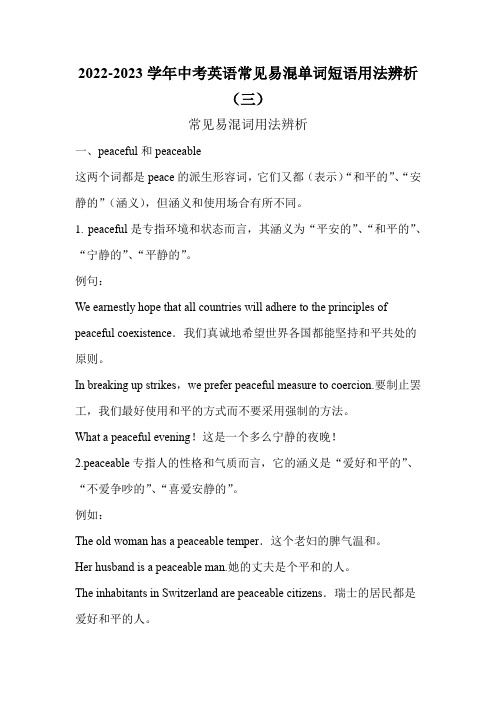
2022-2023学年中考英语常见易混单词短语用法辨析(三)常见易混词用法辨析一、peaceful和peaceable这两个词都是peace的派生形容词,它们又都(表示)“和平的”、“安静的”(涵义),但涵义和使用场合有所不同。
1.peaceful是专指环境和状态而言,其涵义为“平安的”、“和平的”、“宁静的”、“平静的”。
例句:We earnestly hope that all countries will adhere to the principles of peaceful coexistence.我们真诚地希望世界各国都能坚持和平共处的原则。
In breaking up strikes,we prefer peaceful measure to coercion.要制止罢工,我们最好使用和平的方式而不要采用强制的方法。
What a peaceful evening!这是一个多么宁静的夜晚!2.peaceable专指人的性格和气质而言,它的涵义是“爱好和平的”、“不爱争吵的”、“喜爱安静的”。
例如:The old woman has a peaceable temper.这个老妇的脾气温和。
Her husband is a peaceable man.她的丈夫是个平和的人。
The inhabitants in Switzerland are peaceable citizens.瑞士的居民都是爱好和平的人。
二、out of question和out of the question这一对片语仅差一字之微,涵义却大相径庭。
1.out of question的意思是“毫无疑问”,它是副词性短语,修饰谓语动词或整个句子。
其义相当于beyond question,beyond doubt。
例句:The general trend of the situation in Bosnia is out of question,developing in a direction more favourable to peace.毫无疑问,波斯尼亚形势的总趋势是朝着更加有利于和平的方向发展。
中考英语易混词汇辨析
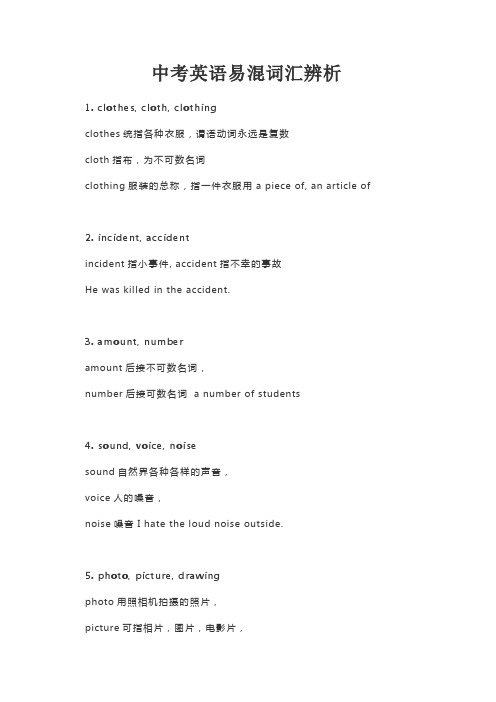
中考英语易混词汇辨析1. clothes, cloth, clothingclothes统指各种衣服,谓语动词永远是复数cloth指布,为不可数名词clothing服装的总称,指一件衣服用a piece of, an article of2. incident, accidentincident指小事件, accident指不幸的事故He was killed in the accident.3. amount, numberamount后接不可数名词,number后接可数名词 a number of students4. sound, voice, noisesound自然界各种各样的声音,voice人的嗓音,noise噪音I hate the loud noise outside.5. photo, picture, drawingphoto用照相机拍摄的照片,picture可指相片,图片,电影片,drawing画的画Let's go and see a good picture.6. weather, climateweather一天内具体的天气状况,climate长期的气候状况The climate here is not good for you.7. road, street, path, wayroad具体的公路,马路,street街道,path小路,小径,way道路,途径take this road; in the street, show me the way to the museum.8. course, subjectcourse课程(可包括多门科目),subject科目(具体的学科)a summer course9. custom, habitcustom传统风俗,习俗,也可指生活习惯,后接to do,habit生活习惯,习惯成自然,后接of doing.I've got the habit of drinking a lot.10. cause, reasoncause指造成某一事实或现象的直接原因,后接of sth./doing sth,reason用来解释某种现象或结果的理由,后接for sth./doing sth. the reason for being late11. exercise, exercises, practiceexercise运动,锻炼(不可数),exercises练习(可数),practice(反复做的)练习Practice makes perfect.12. class, lesson作"课"解时,两者可以替换.指课文用lesson.指班级或全体学生用class. lesson 6; class 513. speech, talk, lecturespeech指在公共场所所做的经过准备的较正式的演说,talk日常生活中的一般的谈话,讲话,lecture学术性的演讲,讲课 a series of lecture on…14. work, job二者均指工作。
中考英语易混淆的词组辨析
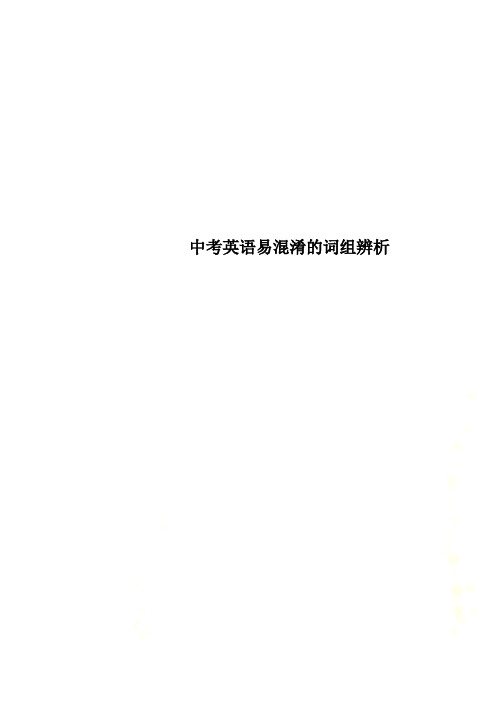
中考英语易混淆的词组辨析11.get to 到达 eg:He got to Beijing yesterday.对...影响 eg:Please turn down the radio, it gets to me.12,上下车。
get off 下(车)get on 上(车)这两个是上(下)较高的车,如bus,plane,get out of 下(车)get into 上(车)这两个是上(下)较低的车,如taxi,关于take1,take off 脱下;移去 eg:He took off his raincoat and took out the key.他脱下雨衣,拿出钥匙。
起飞 eg:The plane will take off soon.飞机马上就要起飞了。
休假 eg:He took two weeks off in August.他在八月份休假了两个星期。
2,take on 穿上;呈现 eg:The insect can take on the color of its surroundings.这种昆虫能随环境而变色。
承担 eg:He is unwilling to take on heavy responsibilities.他不愿承担重任。
3,take in 让...进入;接受 eg:The club took in a new member last week.俱乐部上星期又吸收了一名新会员。
改小;改短 eg:The dress needs to be taken in a bit.这衣服需要稍微改小一点欺骗 eg:I was completely taken in by his words.吸收 eg:This article is too difficult to take in4,take down 写下;记下 eg:He took down her speech. 他记下了她的演说。
- 1、下载文档前请自行甄别文档内容的完整性,平台不提供额外的编辑、内容补充、找答案等附加服务。
- 2、"仅部分预览"的文档,不可在线预览部分如存在完整性等问题,可反馈申请退款(可完整预览的文档不适用该条件!)。
- 3、如文档侵犯您的权益,请联系客服反馈,我们会尽快为您处理(人工客服工作时间:9:00-18:30)。
中考英语易混词组经典辨析关于turn1,turn on打开;发动Will you turn on the radio?你打开收音机好吗?2,turn off关掉Turn off the light before you leave.离开前请把灯关掉。
成功例句暂无3,turn up出现,露面eg: He didn't turn up at the meeting yesterday.出现;发生Something unexpected has turned up.发生了没有意料到的事情。
4,turn down1,拒绝His proposal was turned down.他的提议被拒绝了。
2,关小Dad,can you turn down the TV? It's too noisy. -----OK.爸,你能把电视声音关小一点吗------好的5,turn out结果是;证明是The party turned out to be very successful.晚会结果开得很成功。
6,turn back阻止;阻挡The car was turned back at the frontier.汽车在边境处被拦住了。
7,turn in交上;归还Turn in all the tools after use.全部工具用后都要归还。
8,turn to求助于;转向We can turn to him for help.我们可以求助于他。
7.turn around转身Turn around! Yow are going the wrong way. 转回来!你走错路了。
关于get1,get up1. 起床What time does he get up?他几点起床?2. 变得猛烈The wind is getting up.风越刮越大。
3. 筹备She is getting up a performance.她正在筹备一场演出。
4. 打扮;装饰She got herself up in a new dress.她穿上了新连衣裙。
2,get down1. 吞下She couldn't get the medicine down.那药她吞不下去。
2. 记录Please get down what he says.请把他的话记下。
3. 使沮丧The continual wet weather is getting me down. 持续的潮湿天气使我沮丧。
3,get down to1. 开始认真对待He got down to his work after the holidays.度假之后他开始专心工作。
4,get off1. 动身They got off immediately after lunch.他们吃过午饭马上就动身了。
2. 免于受罚The boy got off.这孩子没有受罚。
5,get on1. 进展Everything was getting on very well.一切进行得很顺利。
2. 出人头地He's sure to get on in the world.他一定会出人头地。
3. 登(车);上(马)6,get back1. 回来;回家When did you get back?你什么时候回来的?2. 重新上台(执政)The Democrats hope to get back at the next election.民主党希望在下次大选中重新执政。
3. 恢复;取回He got his former job back.他重获旧职。
7,get round/around1. 逃避He got round the difficulty.他避开了这一难题。
2. 说服I got round my father to lend me his car.我说服了父亲借车给我。
8,get at1. 够得着I can't get at the book on the shelf.我拿不到架子上的书。
2. 理解I cannot get at the meaning of this sentence.我不能理解这句句子的意思。
3. 意指,暗示I didn't see what he was getting at until he said he forgot his wallet. 我一直不懂他在暗示什么直到他说出忘了钱夹的事。
What is he getting at?他讲这话是什么意思?9,get out1. 泄漏If the news gets out, there'll be trouble.如果消息泄漏出去,就会有麻烦。
2. 出版Will they get out the book?他们会出版此书吗?10,get out of1. 逃避I couldn't get out of going to that wedding.我不能逃避出席婚礼。
2. 弃绝He got out of the bad habit.他改掉了这个坏习惯。
3. 使说出The police got the truth out of him.警察迫使他说出真相。
11.get to1.到达He got to Beijing yesterday.2.对...影响Please turn down the radio, it gets to me.12,上下车。
get off 下(车)get on 上(车)这两个是上(下)较高的车,如bus,plane,get out of 下(车)get into 上(车)这两个是上(下)较低的车,如taxi,关于take1,take off1. 脱下;移去He took off his raincoat and took out the key.他脱下雨衣,拿出钥匙。
2. 起飞The plane will take off soon.飞机马上就要起飞了。
3. 休假He took two weeks off in August.他在八月份休假了两个星期。
2,take on1. 穿上;呈现The insect can take on the color of its surroundings. 这种昆虫能随环境而变色。
2. 承担He is unwilling to take on heavy responsibilities.他不愿承担重任。
3,take in1. 让...进入;接受The club took in a new member last week.俱乐部上星期又吸收了一名新会员。
2. 改小;改短The dress needs to be taken in a bit.这衣服需要稍微改小一点3.欺骗I was completely taken in by his words.4.吸收This article is too difficult to take in4,take down1. 写下;记下He took down her speech.他记下了她的演说。
2. (使)病倒She was taken down with fever.她发烧病倒了。
5,take from1. 减少;降低The slight damage did not take from the engine's power.那点轻微的损坏并不减低引擎的威力。
6,take out1. 取出The doctor has taken my bad tooth out.医生已拔掉了我的坏牙。
2. 扣除;除去The train fare has already been taken out from his salary.火车费已从他工资中扣除。
3. 带...出去7,take care1. 小心;注意8,take away1. 带走,拿走Who took away my pen?谁拿走了我的钢笔?9,take up1. 开始从事When did he take up football?他是什么时候开始踢足球的?2. 占用;化去The work took up all his time.那工作花费了他所有的时间。
10,take for1. 认为Why does she take me for a fool?她为什么把我当作傻子看待?11,take after(与look like的区别)1. take after意为“长得像,行为、性格等像”,尤其是像自己的长辈,可解释为be similar to。
如:Mary really takes after her mother.玛丽的确长得像她的妈妈。
2. look like可以用于所有场合,既可指人也可指物,只指外表看上去像。
如:The man looks like our headmaster.那个人看起来像我们的校长。
The photo doesn’t look like her at all.那张照片看上去一点儿也不像她。
关于give1,give out1. 分发He gave out books.他分发书本。
2. 用尽Our food supply has given out.我们的食物耗尽了。
3. 公布The news was given out that the king had died.国王的死讯已经公布。
2,give away1. 赠送;分发She gave away all her money to the poor.她把钱都送给穷人了。
2. 在婚礼上把(新娘)交给新郎The bride was given away by her father.在婚礼上,新娘由其父亲交给新郎。
3. 泄露His accent gave him away as a northerner.他的口音让人听出他是北方人。
3,give up1. 让出He gave up his seat to an old man.他让座给一位老人。
2. 放弃The girl gave up halfway.这女孩中途放弃。
3. 戒绝I wish I could give up drinking.我真希望自己能戒酒。
4,give in1. 让步He has given in to my views.他已让步,接受了我的看法。
2. 呈交Please give in your examination papers now.现在请交上试卷。
5,give off1. 发散The food gave off a bad smell.食物已经发臭了。
